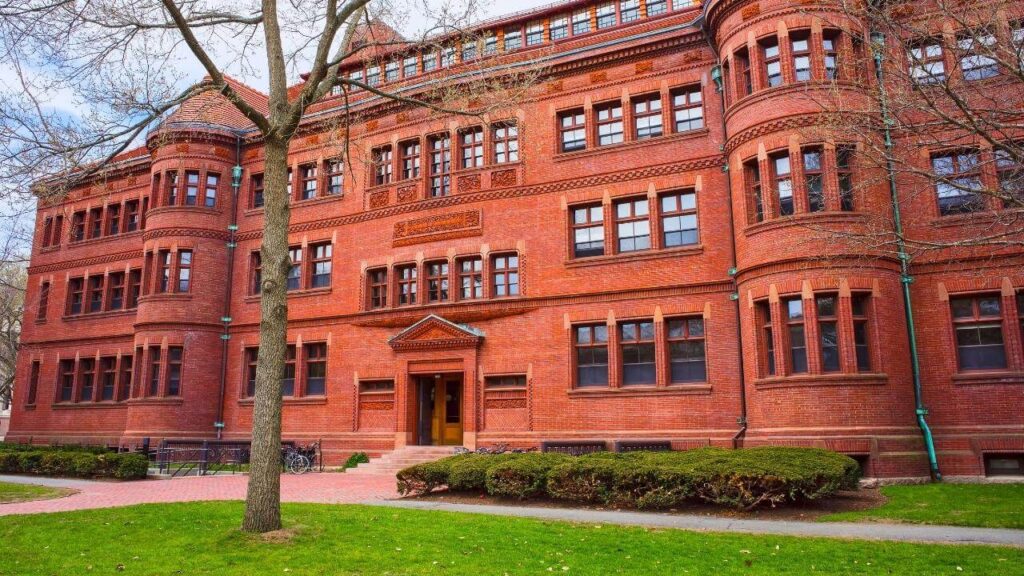If you think and wonder, what can you study at Harvard University? We have a very clear answer for you. Harvard, a top-notch university in the USA provides many learning chances.
When it comes to study at Harvard University, they have over 3,700 courses in 50 study areas. Students can try different subjects and follow their interests.
In this article, we will let you know about the various options for those wanting to study at Harvard. Not only that you will know how you can enjoy a unique educational experience.
What can you study at Harvard University: an overview
Harvard University is a top-notch place for learning. It provides many academic options, starting from focused studies for undergraduates to special degree programs.

This article explores the various options for those eager to study at Harvard and enjoy an unparalleled educational experience. It highlights the benefits available to students at the university.
As an institution renowned for its dedication to the liberal arts & sciences, Harvard fosters a learning environment where students can develop essential skills like critical thinking and analytical reasoning.
However, Harvard offers diverse academic chances. Students can challenge themselves, explore different fields, and become well-rounded, globally conscious leaders. Read on to learn more about the academic offerings at Harvard University.
Harvard University is renowned for its commitment to an educational framework that integrates a broad liberal arts and sciences education.
Harvard provides General Education courses for important questions and urgent problems. These courses make sure students are well-rounded and ready for future challenges.
The core of Harvard’s academic experience is the wide variety of courses. They cover different subjects, meeting students’ unique interests and career goals.
Different categories of courses at Harvard University
The university’s curriculum encompasses a wide array of educational offerings, from foundational General Education courses to specialized degree programs.
Let’s delve deeper into the different categories that constitute Harvard’s academic catalog:
- General Education Courses
- Departmental Courses
- Elective Courses
- Expository Writing Courses
- Language Courses
Each category at Harvard aims to develop specific skills and deep knowledge in different subjects. This contributes to a diverse curriculum at Harvard University.
‘Our mission is to educate the citizens and citizen-leaders for our society… We do this through our commitment to the transformative power of a liberal arts and sciences education.’ — Harvard College
To show how vast and diverse the degree programs at Harvard are, check out the table below. It highlights the various fields of study at Harvard University:
| Field of Study | Examples of Concentrations |
|---|---|
| Arts & Humanities | English, History of Art and Architecture, Music, Theater, Film and Media Studies |
| Social Sciences | Economics, Government, Psychology, Sociology and Anthropology |
| Science, Engineering, and Applied Sciences | Applied Mathematics, Biology, Chemistry, Computer Science, Environmental Science and Engineering |
| Interdisciplinary Fields | History and Literature, Linguistics, Astrophysics, Neuroscience, Human Developmental and Regenerative Biology |
By combining students’ innate interests and talents with Harvard’s rich academic offerings, a personalized, well-rounded educational experience is forged.
Identically, these courses at Harvard University are remarkable. They help students understand the world better and give them skills to make meaningful contributions to society.
The Liberal Arts & Sciences: A Cornerstone of Harvard Education
At the core of Harvard College’s mission is the commitment to providing a comprehensive liberal arts & sciences education that equips students with critical thinking, analytical reasoning, and clear writing skills.
Not only that, this philosophy is important for a comprehensive education in different academic subjects at Harvard. It helps students grasp and tackle the complicated issues in our world today.
The value of a broad education across disciplines
Notably, President Lawrence Bacow has emphasized the importance of a broad education in understanding and addressing the world’s complexities. By nurturing intellectual curiosity and interdisciplinary studies, Harvard College fosters an environment where students can explore the vast array of academic disciplines that make up the liberal arts & sciences.
“For me, the essence of the liberal arts is exactly that freedom to explore things that interest you deeply and also to recognize that those interests may change over time,” Bacow once said. “It’s an opportunity to grow as a person and to learn.”

Basically, this varied educational experience motivates students to deal with challenging questions and ideas from different fields. It builds a strong base for an education that can bring about positive changes.
Critical thinking and reasoning: Skills beyond the classroom
A Harvard education goes beyond academics. It aims to create well-rounded global citizens. These individuals are prepared to meet real-world challenges. They are not just about simple academic success. As such, cultivating critical thinking and reasoning skills is crucial.
Harvard College provides a rigorous, broad, and flexible foundation in liberal arts & sciences that helps students acquire an arsenal of skills and knowledge with applications far beyond the traditional classroom.
Here are four essential skills developed by a Harvard College liberal arts & sciences education:
- Data Analysis and Interpretation
- Effective Writing and Communication
- Leadership and Teamwork
- Global and Cultural Awareness
Skills like these are at the heart of a Harvard education. They prepare graduates for future challenges in their personal, professional, and civic lives.
Diving Deep into Concentrations – Majors at Harvard University
Harvard University offers a broad academic environment. Students can pick from over 3,700 courses in various undergraduate fields called concentrations. These concentrations cover interdisciplinary majors, letting students explore interests deeply and connect different academic areas.
Every concentration at Harvard gives a special chance to dive deep into a specific subject. At the same time, it readies students for various personal and professional life experiences. Popular concentrations include Economics, Computer Science, and History, among others. To provide a better understanding of the breadth of concentrations at Harvard, the following table illustrates some examples:
| Category | Concentration | Interdisciplinary Approach |
|---|---|---|
| Arts & Humanities | English | Fusing literary studies with writing and language |
| Social Sciences | Economics | Applying mathematical models to historical and sociopolitical contexts |
| Sciences, Engineering & Applied Sciences | Computer Science | Connecting technology with problem-solving in various academic disciplines |
| Interdisciplinary Studies | Environmental Science and Public Policy | Integrating scientific methods, policy-making, and global perspectives |
At Harvard, students aren’t restricted to a small list of subjects. Instead, the university encourages them to explore a variety of academic areas. This way, students can develop a deep understanding of how different fields are connected. As a result, they gain valuable interdisciplinary skills, leading to a more comprehensive learning experience.
“You can’t compartmentalize knowledge, and it’s very easy in a place like this that has a million things going on…to pursue a very deep exploration of issues only within one narrow band…All of the great ideas come from people transcending their disciplinary boundaries.” – Dean Claudine Gay at Harvard University.
In truth, Harvard’s academic approach involves combining different subjects to spark curiosity and equip students with tools for global challenges. At Harvard, undergraduate education goes beyond meeting basic requirements.
Surprisingly, it emphasizes gaining a deep understanding of one’s chosen subject and developing lifelong learning skills crucial for success in a constantly changing world.
The path of double concentrations and joint degrees
At Harvard University, students have the unique opportunity to craft their academic journey by pursuing double concentrations or joint degrees. Both of these options provide students with a way to blend their passions and interests, enabling them to acquire knowledge and skills across multiple academic disciplines.
Exploring multiple interests with Double Concentrations
Since the 2022-2023 academic year, Harvard has let students choose a double concentration. This means they can follow two different and thorough paths of study.
If students go for double concentrations, they can explore different academic interests without having to do a mandatory senior thesis, unless one of the fields requires an honors thesis.

‘Soon with double concentrations, students have the freedom to follow their intellectual curiosity across various disciplines, creating a well-rounded and tailored educational experience.’
Integrating Knowledge through Joint Concentrations
At Harvard, joint concentrations empower students to blend two undergraduate concentrations into a unified program of study. This program includes an interdisciplinary senior thesis. With this approach, students can bring together knowledge from two different academic areas, leading to a deeper understanding of how these subjects connect in their chosen fields.
- Benefits of joint concentrations:
- Greater interdisciplinary focus
- Opportunity to complete a unique senior thesis
- Enhanced critical thinking skills across disciplines
- Expanded career and graduate study opportunities
Create an image of two overlapping circles with the words ‘double concentrations’ and ‘joint degrees’ written inside them, surrounded by various symbols representing different fields of study at Harvard University. T
he background should be a mix of the university’s traditional crimson color and shades of blue, representing diversity and collaboration.
Ultimately, double concentrations and joint degrees at Harvard provide students with the academic flexibility essential for today’s evolving world. While going through their undergraduate journey, students can confidently build on their strengths and interests.
This helps them create a personalized education that readies them not just for their careers but also for lifelong learning. It equips them for meaningful engagement with complex global issues.
Crafting your educational journey: special concentrations at Harvard
Certainly, students with unique academic dreams can explore special concentrations at Harvard. These options let them create personalized degree plans that match their specific goals.
With these custom programs, students can delve into groundbreaking research areas or combine disciplines that aren’t part of the regular Harvard curriculum.
In order to pursue a special concentration, students are required to create a detailed proposal. This proposal should outline their academic goals while highlighting the interdisciplinary research they aim to conduct.
Subsequently, these proposals are submitted to the Standing Committee on Special Concentrations. This committee meticulously evaluates each plan, making individualized decisions based on merit and feasibility.
Special concentrations at Harvard open doors to unique academic possibilities, enabling students to explore cutting-edge research and interdisciplinary studies that transgress traditional boundaries.
In addition to the tailored coursework, students pursuing special concentrations engage in extensive research projects. These endeavors often culminate in a senior thesis.
Furthermore, the results of these projects contribute not only to the academic community but also stand as a testament to the students’ rigorous intellectual pursuits.
| Benefits of Special Concentrations | Challenges of Special Concentrations |
|---|---|
| Customized degree programs tailored to unique academic goals | Requires extensive planning and proposal writing |
| Opportunity to engage in interdisciplinary research | Greater responsibility for managing coursework and resources |
| Access to mentorship from experts in specialized fields | Need for strong self-motivation and discipline |
Harvard ensures each student’s academic journey remains truly unique by allowing them to pursue special concentrations. This fosters growth in both intellectual and personal spheres.
Consequently, graduates emerge fully prepared from their college experience to tackle the complex challenges and opportunities that lie ahead.
Experiencing the rigor of Harvard’s core requirements
Equally, at the heart of a Harvard education lies a rigorous curriculum designed to ensure students receive a well-rounded understanding of the world. This goal is acutely realized through Harvard College requirements, which comprise a comprehensive range of General Education courses and other core necessities.
By actively engaging with this curriculum, students not only gain invaluable knowledge and insights but also, more importantly, expand their skills and perspectives. This preparation is essential for global engagement with various world issues.
General education that connects with the world
When it comes to study at Harvard University, their program in General Education is fulfilled with courses across four categories. These encompass some of the most pressing problems and inquiries of our time:
- Aesthetics & Culture
- Ethics & Civics
- Histories, Societies, Individuals
- Science & Technology in Society
Finally, through active participation in courses within these areas, students enhance their understanding of broader societal concerns. This preparation equips them to apply their knowledge to real-world issues more effectively.
Intersecting Arts, Humanities and the Sciences in your curriculum
To expose students to a wide range of scholarly pursuits, Harvard’s distribution requirement necessitates engagement with various academic disciplines. Courses in the following divisions are mandated:
- Arts and Humanities
- Social Sciences
- Science, Engineering, and Applied Sciences
This interdisciplinary approach to education ensures that students gain a broad understanding of various fields. Altogether it can effectively collaborate with peers from diverse backgrounds.
Furthermore, two additional components of Harvard’s core curriculum include Quantitative Reasoning with Data and Expository Writing. These courses foster skills essential to understanding complex data sets and producing scholarly written work, respectively. Harvard gives students important skills. These skills help them do well in school and also in their jobs and personal lives.
To sum up, when students take part in Harvard’s challenging core requirements, they dive into a varied learning experience. Participating in this experience broadens their views, deepens their grasp of tricky topics, and provides them with useful skills for success in a changing world.
Other academic opportunities at Harvard University
At Harvard University, there are several ways for students to diversify their educational journey and further enrich their knowledge. Students have choices beyond their main studies at Harvard. They can pick additional fields, do independent studies, or join advanced standing programs.
Elevate your studies with secondary fields and language citations
Secondary fields, similar to minors at other institutions, offer students an opportunity to delve into an additional area of study. With over 50 secondary fields currently available, Harvard provides a vast array of options for students interested in multi-disciplinary education.
Likewise for those fascinated by languages and other cultures, Harvard offers language citations. To earn a language citation, students must complete four courses of language instruction beyond the first year. These intensive courses offer insights into the literature, history, and perspectives of various cultures.
Independent study and advanced standing programs
Beyond traditional coursework, Harvard students can also participate in unique independent study programs. These programs allow students to engage in interdisciplinary research, arts practice, or field research projects that stretch their abilities and interests beyond the classroom setting.
Harvard also caters to highly motivated and high-achieving students through its advanced standing programs. By fulfilling certain prerequisites, students with advanced standing can choose to undertake a master’s degree in select fields during their fourth year at the university.
‘The variety of academic opportunities at Harvard University truly allows students to customize their education and explore their passions to the fullest.’
Overall, the range of academic opportunities available at Harvard University empowers students to take control of their educational journey, creating a unique and impactful learning experience.
The intersection of Arts and Academia: dual degree music programs
For students who are exceptional musicians as well as dedicated scholars, Harvard offers dual degree music programs in partnership with the New England Conservatory (NEC) and Berklee College of Music. These programs allow for an immersive music training experience alongside a comprehensive liberal arts education.
If you go to study at Harvard University for music and study two degrees, you’ll learn at two really good schools for both regular subjects and music.
Generally, the New England Conservatory and Berklee College of Music are well-known for their outstanding music programs. They are also recognized for their dedication to providing excellent education.
Institutions and their highlights to study at Harvard University
| Institution | Highlights |
|---|---|
| Harvard University | Top-ranked liberal arts education with comprehensive course offerings across all disciplines |
| New England Conservatory (NEC) | Renowned conservatory with world-class faculty and diverse offerings in classical, jazz and contemporary music |
| Berklee College of Music | Leading institution for the study of contemporary music, with a focus on performance, composition and production |
Combining the best of both worlds, students enrolled in dual degree music programs have the advantage of not only broadening their musical horizons but also strengthening their academic foundations.
The curriculum is carefully designed to accommodate the demands of both the music and academic programs, ensuring that students receive the highest level of education and training in their chosen fields.
‘The dual degree music programs at Harvard, in partnership with the New England Conservatory and Berklee College of Music, provide students with unparalleled opportunities to explore their passions for both music and academia.’
- Develop expertise in their chosen music discipline, with access to world-class faculty and resources at NEC or Berklee.
- Pursue a rigorous academic education in a chosen concentration at Harvard, building a strong foundation across a broad range of subjects.
- Expand their network and collaborate with faculty and peers from both institutions, fostering connections that will serve them throughout their careers.
- Graduate with two degrees: one from Harvard and one from either the New England Conservatory or the Berklee College of Music.
In conclusion, the dual degree music programs offered at Harvard in partnership with the New England Conservatory and Berklee College of Music provide exceptional opportunities for students to obtain the best of both worlds in terms of music and academia.
These unique programs offer students unparalleled access to outstanding faculty, resources, and institutions, ultimately preparing them for successful careers as both musicians and scholars.
Expanding your global perspective with study abroad options
At the same time, the Harvard University authority recognizes the importance of global education for students to better understand diverse cultures, face new challenges, and gain international experiences.
On the other hand, their study abroad programs offer opportunities for students to spend a semester or an academic year enrolled at a foreign university, broadening their perspectives and enhancing their academic journey.
The Office of International Education (OIE) plays a pivotal role in assisting students with integrating their study abroad experiences into their Harvard academic plans.

Even though, with numerous university partnerships worldwide, their mission is to ensure a seamless, culturally enriching educational journey for our students.
Studying abroad allows Harvard students to engage with new perspectives, immerse themselves in diverse cultures, and develop critical skills that will shape them into global leaders.
Some of the study abroad programs at Harvard include:
- Harvard Summer School Study Abroad Programs
- Harvard College in Asia Program (HCAP)
- Harvard Global Seminars
- Independent Semester and Year-Long Opportunities
Students interested in a more research-focused experience can also pursue international internships and research opportunities. These opportunities often serve as an excellent complement to their undergraduate studies, while gaining valuable firsthand research experience in their chosen fields.
| Program Type | Location | Duration |
|---|---|---|
| Harvard Summer School Study Abroad | Various Countries | 4-8 Weeks |
| Harvard College in Asia Program (HCAP) | Multiple Asian Countries | 3 Weeks |
| Harvard Global Seminars | Various Countries | 2-3 Weeks |
| Independent Semester and Year-Long Opportunities | Various Countries | 1 Semester or 1 Academic Year |
Through our diverse range of international studies opportunities, Harvard students can develop a more profound understanding of the world while acquiring critical skills that will benefit them in their academic and professional journeys.
Tuition fees to study at Harvard University
Basically, Harvard University’s tuition fees for the academic year vary across its schools. For Harvard College, the total cost, including tuition, health services, housing, student services, activities fee, and food, amounts to $79,450.
At the Graduate School of Arts and Sciences (GSAS), standard tuition is $54,032, with variations for reduced tuition, facilities fee, and course rates.
The School of Engineering and Applied Sciences (SEAS) has specific tuition rates for various master’s programs, ranging from $7,721 to $61,768. These costs contribute to Harvard’s world-class education.
Preparing for a lifetime of success at Harvard University
In brief, Harvard University stands as a leader in higher education, providing an incredible array of academic programs that shape well-rounded, globally conscious leaders.
With a dedication to holistic educational experiences, Harvard empowers students to develop a strong foundation in liberal arts & sciences, interdisciplinary learning, and critical thinking.
These skills, along with robust support networks such as the Office of Undergraduate Education, Advising Centers, and the Academic Resource Center, help ensure lifelong learning, leadership, and service.
Since students progress through their academic journey, the array of courses, concentrations and extracurricular opportunities available at Harvard allows them to customize their education to meet their unique aspirations and career goals.
At any cost, the university’s commitment to a comprehensive and tailored educational experience prepares students to face the world’s challenges with confidence and ingenuity.
As they explore their interests, develop their passions, and cultivate new insights, Harvard students emerge prepared to make meaningful contributions to society.
In conclusion, studying at Harvard University provides a solid foundation for personal growth and career success. As they learn from renowned professors, engage in influential research, and make connections with their peers, students have numerous opportunities to achieve their full potential.
With access to cutting-edge resources and various academic offerings, Harvard students continue to push the boundaries of knowledge and strive for a better future for all.
Scholarships to study at Harvard University
Harvard University offers a range of scholarships to support students in pursuing their education. These scholarships are available for both undergraduate and graduate programs.
The Harvard Financial Aid initiative ensures that admitted students can attend regardless of financial circumstances. Scholarships cover tuition, room, and board, aiming to alleviate the financial burden on students.
Harvard University provides various scholarships to assist students in their academic journey. However, Five notable scholarships include:
- Harvard College Scholarship: Supporting undergraduate students with financial need, covering tuition, room, and board.
- Harvard Presidential Scholarship: Awarded to exceptional students based on academic achievements and leadership qualities.
- Harvard Law School Public Service Venture Fund Fellowship: Aids law students pursuing public service careers by providing financial support.
- Harvard Business School Fellowship: Assisting MBA students with a demonstrated need to access the transformative Harvard Business School experience.
- Harvard Medical School Dean’s Scholarship: Supporting medical students through financial assistance to pursue their education in the medical field.
FAQs about study at Harvard University
What are the primary areas of study at Harvard University?
Harvard University offers more than 3,700 courses within 50 undergraduate fields of study, referred to as concentrations.
These concentrations span a wide range of academic disciplines and are designed to provide students with a comprehensive liberal arts and sciences education.
What are the core requirements for a Harvard College education?
Harvard College requires students to complete courses in General Education, which cover four categories: Aesthetics and culture; Ethics and civics; Histories, Societies, and Individuals; and Science and Technology in Society.
Additionally, courses in Arts and Humanities, Social Sciences, Science, Engineering and Applied Sciences, as well as Quantitative Reasoning with Data and Expository Writing, form essential components of the overall curriculum.
Can students pursue double concentrations or joint degrees at Harvard?
Yes, Harvard introduced the option for students to declare a double concentration in the 2022-2023 academic year. Joint concentrations that combine two undergraduate concentrations into one program of study are also available, culminating in an interdisciplinary senior thesis.
What additional academic opportunities does Harvard provide?
In addition to primary concentrations, students can pursue secondary fields (similar to minors) and language citations. There are also independent study programs for unique academic inquiries, dual degree music programs in partnership with the New England Conservatory and Berklee College of Music, and study abroad options for international exposure.
Conclusion
As I have said, Harvard University offers a diverse range of academic programs, providing students with the opportunity to explore their interests and passions. The university is renowned for its excellence in various fields.
Generally, students can study subjects such as humanities, social sciences, natural sciences, engineering, business, law, medicine, and many more.
Harvard’s extensive course offerings cater to a wide array of disciplines, ensuring that learners can pursue their academic and intellectual goals across various domains.
